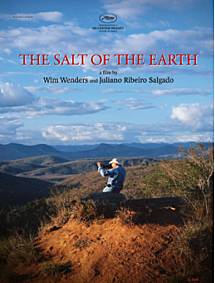The Salt of the Earth (2014 film)
| The Salt of the Earth | |
|---|---|
 Film poster | |
| Directed by | |
| Written by |
|
| Produced by | |
| Cinematography |
|
| Edited by |
|
| Music by | Laurent Petitgand |
Production company | |
| Distributed by | Le Pacte |
Release dates |
|
Running time | 110 minutes[1] |
| Countries |
|
| Languages |
|
| Box office | $3.6 million[2] |
The Salt of the Earth is a 2014 internationally co-produced biographical documentary film directed by Wim Wenders and Juliano Ribeiro Salgado.[3] It portrays the works of Salgado's father, the Brazilian photographer Sebastião Salgado.
The film was selected to compete in the Un Certain Regard section at the 2014 Cannes Film Festival[4] where it won the Special Prize.[5] The film was nominated for the Academy Award for Best Documentary at the 87th Academy Awards.[6] It won the 2014 Audience Award at the San Sebastián International Film Festival and the 2015 Audience Award at the Tromsø International Film Festival.[7][8] It also won the César Award for Best Documentary Film at the 40th César Awards.[9]
Salgado's work explored natural environments and the humans who inhabit them.[10] His black and white photographs illuminated how the environment and humans are exploited to maximize profit for the global economic market.
The film follows Salgado as he began a career as an economist with his wife, Lélia, at his side. During a stint in Paris, Lélia bought a camera,[11] and Salgado discovered his love of photography.
Following the timeline of his life, the film uses his own photos and videos to illustrate Salgado's life and work beginning with his exile from Brazil and his subsequent transition from economist to artist and explorer [12] Salgado began working full time as a photographer in 1973, first news photography then documentary style, with Lelia supporting him.
The film follows him as he travels around South America, including the countries neighboring his native Brazil, spending time among and photographing native tribes, living lives not much touched by the modern world.
Co-directed by Salgado's son, Juliano Ribeiro Salgado, the film contains recollections from childhood of a father who was absent much of the time and the times he accompanied his father on trips to discover who Salgado was beyond his childhood conception.
Next, Salgado traveled to the Sehel region of Africa, show in unflinching and heartbreaking video and photographs. Salgado referred to the famine in Ethiopia as a problem with sharing, not just a natural disaster. He documented the largest ever refugee camps and the innumerable deaths that occurred there, from hunger, cholera, and cold.
His work covering famine in Africa brought worldwide attention to the region and the underlying causes.
The film follows 40 years of Salgado's work from South America, to Africa, Europe, the Arctic, and back home to Brazil focusing international conflicts, starvation and exodus and natural landscapes in decline.
Reception
The Salt of the Earth received largely positive reviews from critics. On Rotten Tomatoes, the film reports a 96% approval rating with an average rating of 8/10 based on 77 reviews. The consensus states: "While the work it honors may pose thorny ethical questions that Salt of the Earth neglects to answer, it remains a shattering, thought-provoking testament to Sebastião Salgado's career."[13] On Metacritic, the film has an 83/100 rating based on 29 critics, indicating "universal acclaim".[14]
References
- ^ "The Salt of the Earth (12A)". British Board of Film Classification. 9 April 2015. Retrieved 9 April 2015.
- ^ "Salt of the Earth". Box Office Mojo. Retrieved 26 April 2015.
- ^ "Wim Wenders Sets Sail for Cannes, But Where Is 'Every Thing Will Be Fine'?". IndieWire. Retrieved 18 April 2014.
- ^ "2014 Official Selection". Cannes. Retrieved 18 April 2014.
- ^ "Un Certain Regard 2014 Awards". Festival de Cannes 2014. Retrieved 23 May 2014.
- ^ "Oscars 2015: Full List of Nomiations". entertainmentweekly.com. Entertainment Weekly. Retrieved 15 January 2015.
- ^ sansebastianfestival.com Other awards of the 62nd edition
- ^ tiff.no Award Winners 2015
- ^ "Cesar Awards: 'Timbktu' Sweeps, Kristen Stewart Makes History". The Hollywood Reporter. Retrieved 28 February 2015.
- ^ "Sebastião Salgado | artnet". www.artnet.com. Retrieved 14 February 2017.
- ^ "Sebastião Salgado: A God's eye view of the planet - interview". Telegraph.co.uk. Retrieved 14 February 2017.
- ^ Funk, McKenzie. "Sebastião Salgado Has Seen the Forest, Now He's Seeing the Trees". Smithsonian. Retrieved 14 February 2017.
- ^ "The Salt of the Earth". Rotten Tomatoes. Flixster. Retrieved 9 April 2015.
- ^ "The Salt of the Earth Reviews". Metacritic. CBS Interactive. Retrieved 9 April 2015.
External links
- 2014 films
- 2010s biographical films
- 2010s documentary films
- French films
- French biographical films
- French documentary films
- Brazilian films
- Brazilian biographical films
- Brazilian documentary films
- Italian films
- Italian biographical films
- Italian documentary films
- French-language films
- Italian-language films
- Portuguese-language films
- English-language films
- Biographical documentary films
- Films directed by Wim Wenders
- Films shot in Brazil
- Films shot in Indonesia
- Films shot in Russia
